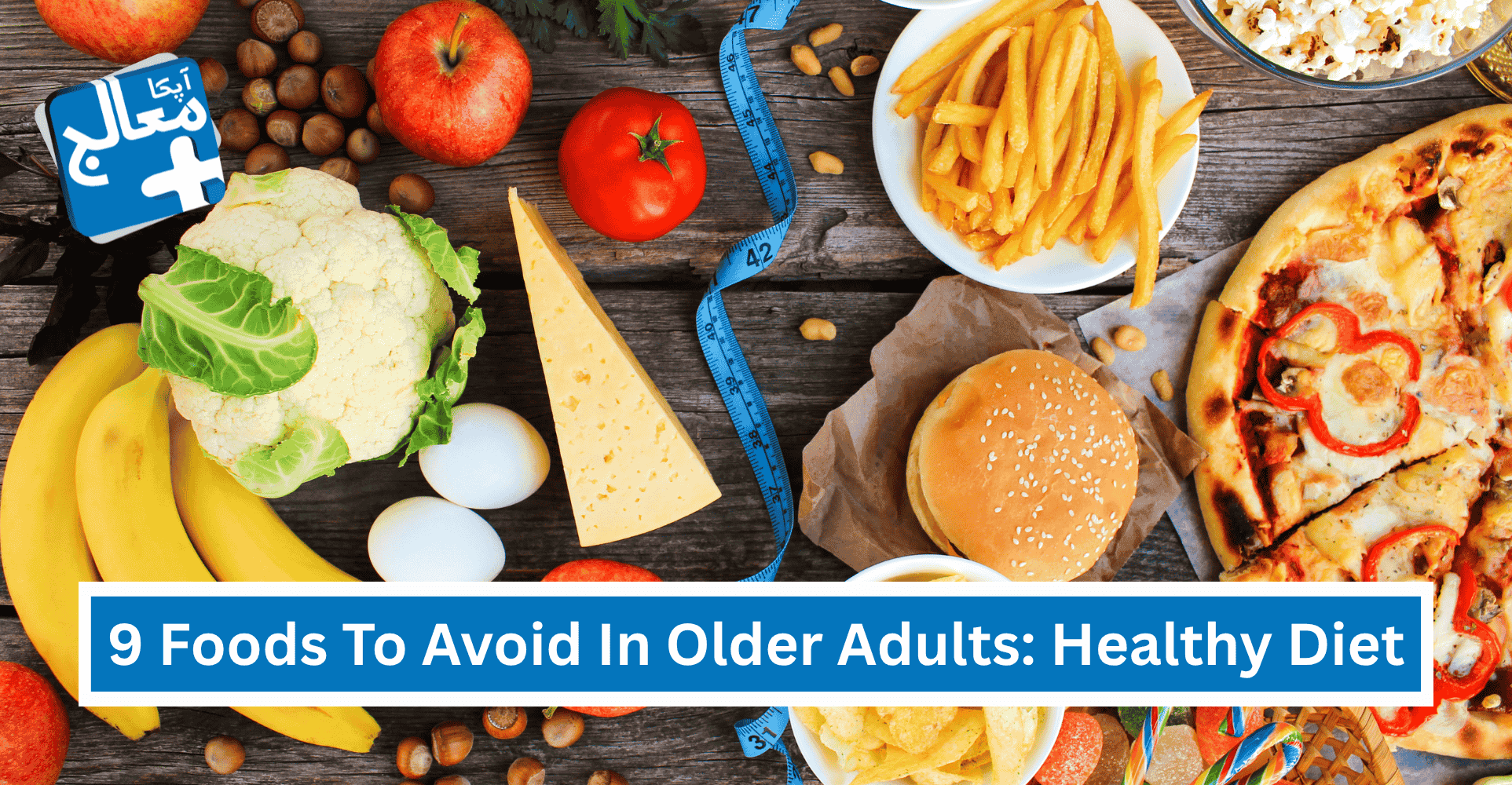9 Foods To Avoid In Older Adults: Healthy Diet For Elderly

Food is one of the necessities of life and plays a crucial role in maintaining a healthy lifestyle. The nutrients present in food are essential for our growth, development, maintenance of body tissues, and regulation of vital processes. Every cell in our body depends on a continuous supply of energy, which we obtain from the food we consume. A healthy diet consists of a combination of different foods. These include Legumes, cereals, fruits, vegetables, and foods from animal sources
Healthy food is also related to our age because we need to know which foods to add at different stages of life to help prevent chronic diseases, maintain energy, and improve quality of life. However, there are certain foods older adults should avoid or limit for better health.
If you want to know "15 Best Foods to Improve Gut Health Naturally - What Doctors Say", read now.
Who are Older Adults?
According to the World Health Organization (WHO), older adults are defined as
"Most developed world countries have accepted the chronological age of 65 years as a definition of 'elderly' or older person, but this definition is somewhat arbitrary. The UN and WHO often use 60+ years to refer to the older population, especially in developing regions."
Elderly people are also known as older adults or senior citizens. Gradual physical, psychological, and social changes, including decreased strength, slower metabolism, and increased vulnerability to health conditions, characterize this stage of life. That is why older adults should adopt a healthy diet and lifestyle to maintain a healthy life.
Also read: "21 Surprisingly Effective Strategies to Prevent Heart Attack"
9 Foods to Avoid in Older Adults
Processed Meats
-
Include: Processed meat includes bacon, sausages, hot dogs, ham, salami, and luncheon meats.
-
Contain: They are high in sodium, saturated fats, and preservatives such as nitrates.
-
Risk: These compounds increase the risk of heart disease, high blood pressure, and colorectal cancer.
-
Healthier alternative: lean fresh meats, skinless poultry, fish, or plant-based protein sources.
High Sodium Foods
-
Risk: Excessive salt intake increases blood pressure, leading to stroke, heart failure, and kidney damage.
-
Healthier alternative: Use herbs, lemon, and spices instead of salt.
Fried Foods
-
Include French fries, doughnuts, potato chips, fried chicken, etc.
-
Contain: They have high levels of unhealthy fats, such as saturated and trans fats, as well as potentially harmful compounds like acrylamide.
-
Risk: They can cause heart disease, inflammation, and digestive issues in older adults.
-
Healthier alternative: Bake, grill, or air-fry foods with minimal oil.
Raw Animal Products
-
Include Raw or Undercooked Eggs, Meat, and Seafood.
-
Contain: Raw products have harmful bacteria, such as Salmonella, Listeria, and E. coli, which pose serious health issues.
-
Risk: They can cause food poisoning, which can trigger sepsis and septic shock, and seniors are at higher risk because of their weakened immune systems.
-
Healthier alternative: Ensure all meats, seafood, and eggs are thoroughly cooked to prevent foodborne illness.
Sugary Beverages
-
Include Regular sodas (such as cola and fizzy drinks), sweetened fruit juices, energy drinks, Sweetened coffee drinks, etc.
-
Contain: Sugary beverages contain high amounts of added sugars, which are risky for older adults.
-
Risky: They can cause high blood sugar levels, weight gain, diabetes, and increase the risk of heart disease.
-
Healthier alternative: Choose plain water, infused water with mint or lemon, or unsweetened herbal teas.
Alcohol Consumption
-
Contain: Alcohol contains ethanol, a toxic substance that affects the brain, liver, and other organs.
-
Risk: increasing the risk of falls, liver damage, medication interactions, and cognitive impairment in older adults.
-
Healthy alternative: limit to recommended amounts (e.g., one standard drink per day) or alcohol-free beverages.
High-Sugar Foods
-
Include cakes, pastries, candies, chocolates, cookies, and sweetened cereals.
-
Contain: These foods contain high amounts of added sugars and unhealthy fats.
-
Risk: Increases the risk of diabetes, obesity, heart disease, and cognitive decline in elderly adults.
-
Healthier alternative: Choose naturally sweet fruits, such as berries, apples, or oranges.
Grapefruit
-
Risk: Grapefruit can interfere with enzymes that metabolize certain medications used to treat blood pressure, cholesterol, and anxiety, potentially leading to toxic levels or reduced efficacy.
-
Healthier alternative: Consult with your pharmacist or doctor to confirm if grapefruit interacts with your medications before consumption.
Unpasteurized Dairy Products
-
Risk: These can carry harmful bacteria, such as Listeria monocytogenes, which can lead to severe infections in elderly individuals.
-
Healthier alternative: Always buy pasteurized milk, cheese, and yogurt.
Top Healthy Eating Habits for Older Adults
-
Leafy green vegetables (spinach, kale): They are rich in vitamins and minerals.
-
Whole grains (oats, brown rice): They provide fiber for digestion and heart health.
-
Fatty fish (salmon, sardines): They are rich in omega-3 for brain and heart health.
-
Nuts and seeds (such as almonds and flaxseeds) are good sources of healthy fats and protein.
-
Low-fat dairy (milk, yogurt): They provide calcium and vitamin D for bone health.
-
Beans and legumes (lentils, chickpeas): They are rich in protein and fiber.
-
Fruits (berries, apples, oranges): They are packed with vitamins, antioxidants, and fiber.
You may also like to read: "How to Control High Blood Pressure: 7 Useful Tips & Treatment"
Conclusion
The ability to eat and the enjoyment of eating are important aspects of a good quality of life. In other words,
"Being able to eat what I want, when I want."
Makes us feel good. Food provides our bodies with what they need to stay alive, be active, move, and work. They build new cells and tissues to promote growth, maintain our health, and facilitate self-healing to prevent and fight infections. Encourage your parents, grandparents, and elderly loved ones to prioritize their diet with balanced meals and safe food choices.
If you want to consult the best clinical dietitian in Pakistan for personalized dietary recommendations, especially if your elders have medical conditions, you can visit www.apkamuaalij.com. For a quick consultation, dial 0423-2377001 and book your doctor's appointment through Apka Muaalij, the best telehealth platform in Pakistan.
FAQs (Frequently Asked Questions)
Should elderly people eat eggs daily?
Yes, if well-cooked and with no cholesterol restrictions.
Are bananas good for elderly people?
Yes, they provide potassium and energy.
How to improve appetite in older adults?
Small meals, flavorful spices, and social meals can help.
Should the elderly avoid nuts?
No, unless there are chewing difficulties or allergies.
What are the signs of poor nutrition in elderly people?
Fatigue, unintentional weight loss, weakened immunity, and muscle loss.
Is it necessary to avoid all fats in old age?
No. Healthy fats from nuts, seeds, avocado, and olive oil are beneficial for heart and brain health.
How does age affect nutritional requirements?
Aging reduces metabolism, digestive efficiency, and nutrient absorption, increasing the need for nutrient-dense foods.

Dr. Bisma Shehzadi
Dr. Bisma Shehzadi, Pharm.D, RPh, is working as a professional seasoned content writer with 4 years of experience in healthcare and wellness writing. With a strong pharmaceutical background and clinical knowledge, she creates research-driven, search-optimized articles that simplify complex medical topics. Her writing enables her to craft content that educates, promotes wellness, and supports healthcare initiatives among online users and readers.